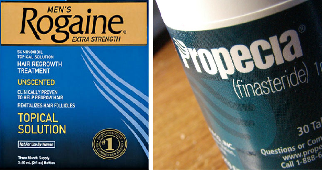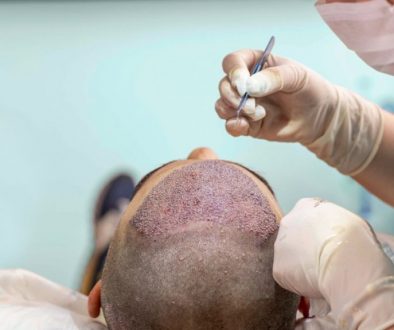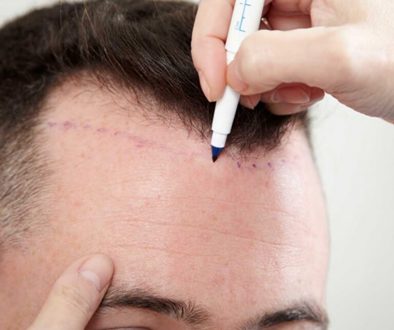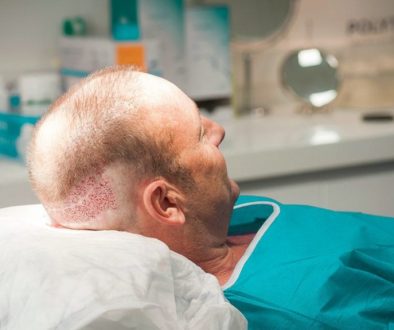Any Hair Loss Medication Options Besides Finasteride (Propecia) and Minoxidil (Rogaine)?
This question comes from a member of our [tag]hair loss[/tag] social community and discussion forums:
I noticed my hair is thinning and want to start preventive [tag]hair loss medications[/tag]. However, I’m afraid of using [tag]minoxidil[/tag] ([tag]Rogaine[/tag]) or [tag]finasteride[/tag] ([tag]Propecia[/tag]) because of the side effects I read about online. Are there any other proven hair loss medications available?
 Two hair loss medications have been reviewed and deemed safe and effective by the US FDA: finasteride (Propecia) and minoxidil (Rogaine). Finasteride is an inhibitor of the enzyme – 5-alpha-reductase – responsible for creating dihydrotestosterone ([tag]DHT[/tag]). DHT causes hair loss in [tag]androgenic alopecia[/tag] or [tag]male pattern hair loss[/tag] – the most common type of alopecia seen in men. Side effects of this medication include: headache, confusion (“brain fog”), and sexual side effects (ie decreased libido, erectile dysfunction, and decreased semen volume or “watery” semen). Most users are concerned about the sexual side effects; however, according to the FDA approval studies, these occur in approximately 2% of patients and cease after stopping the drug. Many doubt these figures and believe some sexual side effects may last longer, but, thus far, no conclusive data exists.
Two hair loss medications have been reviewed and deemed safe and effective by the US FDA: finasteride (Propecia) and minoxidil (Rogaine). Finasteride is an inhibitor of the enzyme – 5-alpha-reductase – responsible for creating dihydrotestosterone ([tag]DHT[/tag]). DHT causes hair loss in [tag]androgenic alopecia[/tag] or [tag]male pattern hair loss[/tag] – the most common type of alopecia seen in men. Side effects of this medication include: headache, confusion (“brain fog”), and sexual side effects (ie decreased libido, erectile dysfunction, and decreased semen volume or “watery” semen). Most users are concerned about the sexual side effects; however, according to the FDA approval studies, these occur in approximately 2% of patients and cease after stopping the drug. Many doubt these figures and believe some sexual side effects may last longer, but, thus far, no conclusive data exists.
Minoxidil (Rogaine) prevents hair loss via an unknown mechanism. The drug relaxes blood vessels and opens potassium channels, so some believe it increases flow of blood, oxygen, and nutrients to the scalp. Others believe the mechanism is more complicated, and likely involves increased production of prostaglandins (PGE2) and growth factors (TGF-B/BMP), and also upregulation of important hair growth genes (BCL2/BAX and ERK/Akt). Side effects of minoxidil include: skin irritation, low blood pressure, hair growth in unwanted areas, chest palpitations, and tissue swelling.
Generally, these side effects are “rare” – according to the manufacturers – and most tolerate hair loss medications well.
Unfortunately, these are the only two medications reviewed and approved for the treatment hair loss. A variety of other creams, salves, shampoos, vitamins, and topical treatments are available, but none have been thoroughly studied or approved by a drug relating agency (like the FDA). Those who cannot tolerate minoxidil or finasteride could research [tag]ketoconazole[/tag]-based shampoos, as these may help with hair loss, but these are rarely used as a “stand alone” treatment. Others could be candidates for surgical [tag]hair restoration[/tag], and may benefit from a consultation with a trusted [tag]hair transplant[/tag] surgeon. Remember, it is important to discuss all new medications and medication changes with a trusted physician first.
________________
Blake Bloxham – formerly “Future_HT_Doc”
Editorial Assistant and Forum Co-Moderator for the Hair Transplant Network, the Hair Loss Learning
Center, the Hair Loss Q&A Blog, and the Hair Restoration Forum
Follow our community on Twitter
Watch hair transplant videos on YouTube



